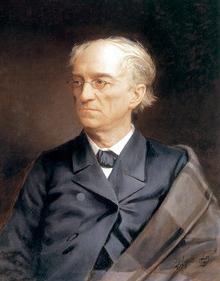Fedor Ivanovich Tyutchev is a talented Russian poet, romantic and classic, who wrote primarily not for anyone, but for himself, revealing his soul on paper. Each of his poems is saturated with truth, the truth of life. It seems that the poet is afraid to express his opinion in the eyes of people, sometimes even alone with himself, he is afraid to admit his feelings and orders himself to remain silent and not to reveal secrets deep in his heart. Tyutchev wrote "Silentium" in 1830, just during the period of the departure of the era of romanticism and the advent of the bourgeois-pragmatic era. The poem shows the author’s regret about the days gone by and his misunderstanding of what will happen next.

Fyodor Ivanovich was a romantic at heart, pragmatism was alien to him, so the source of his inspiration disappeared with the advent of the July bourgeois revolution. The ensuing chaos destroyed all the hopes and expectations of the poet, leaving him in confusion and regret about the irretrievably lost era of romanticism. Almost all of that period of Tyutchev’s poem is imbued with such a mood; Silentium was no exception. The author cannot get rid of the shadows of the past, but gives himself a vow of silence, fleeing from the bustle of the outside world and closing himself.
At the beginning of the poem, the poet describes the sources of inspiration familiar to his lyrical hero: stars in the night sky, water keys. The former symbolize something divine, higher powers, and the latter symbolize nature, something earthly and understandable to each of us. Tyutchev wrote “Silentium” to explain to people the harmony of God with Nature and how it affects humanity. On the other hand, everyone should know their own Universe, the microcosm that reigns in the soul.

In the middle of the poem, the poet asks questions about how to properly voice your thoughts so that the other person understands you correctly, does not misinterpret the words, changing their meaning. Tyutchev "Silentium" wrote with a silent appeal to keep silent and keep everything in himself, to keep the secret of unexpressed thoughts. You can also perceive forced dumbness as a protest against ordinary consciousness, the chaos that is happening around. In addition, the poet could resort to a romantic motive, thus conveying the loneliness of his lyrical hero, lacking understanding.
Analysis of Tyutchev’s poem “Silentium” shows the complete powerlessness of the word, which cannot fully convey what is happening in the soul of a person, his inner experiences and vibrations. Each person is individual and unique in his judgments, thoughts and assumptions. A person has his own ideas about life, in his own way reacts to certain events, so he is not very clear about how his feelings will be interpreted by other people. Each of us had moments when we were tormented by doubts as to whether we would understand what they thought or said.

Tyutchev wrote "Silentium" in order to prove that he believes in what humanity will understand. The poet simply wished to emphasize that there was no need at all to share his thoughts with the public, to discuss important issues with the first person he met. In some situations, it is better to hide your feelings, keep your opinion with you and calm down emotions. Everyone should have their own inner world, hidden from prying eyes: why open it to people who will never understand and appreciate the voiced ideas.